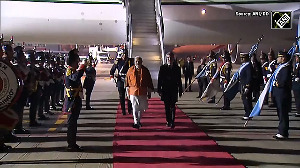Preparations for the launch of GSAT-9, the South Asia Communication Satellite that will boost connectivity among nations in the region, were "going on smoothly," Indian Space Research Organisation Chairman A S Kiran Kumar said on Thursday.

The Geostationary Communication Satellite built by the ISRO will blast off from the Satish Dhawan Space Centre in Sriharikota, about 100 kms from Chennai.
Seven out of the eight SAARC countries are a part of the project, as Pakistan decided to opt out stating "it has its own space programme."
The satellite will be launched on board the space agency's rocket GSLV-F09. Costing around Rs 235 crore, the satellite would serve the neighbouring countries through 12 Ku band transponders carried by it and has a mission life of 12 years.
The satellite is meant for providing communication and disaster support, connectivity among the countries of South Asia region.

It will provide a significant capability to each of the participating countries in terms of DTH, certain VSAT capacity plus linking among the states for disaster information transfer.
"We have the launch tomorrow at 4.57 PM in the evening... All activities are going on smoothly," Kumar told reporters at the airport in Chennai.
After coming to power in May 2014, Prime Minister Narendra Modi had asked ISRO scientists to develop a SAARC satellite that can be dedicated to neighbouring countries as a "gift from India."
On his 'Mann ki baat' programme on Sunday last, Modi had announced that the South Asia Satellite would be India's "priceless gift" to its neighbouring countries.

"On May 5, India will launch the South Asia Satellite. The benefits of this satellite will go a long way in meeting the developmental needs of the countries participating in this project," Modi had said.
On future launches, the ISRO Chairman said, the space agency would launch the GSLV MK III variant which would be followed by Polar Satellite Launch Vehicle in the coming months.
To a query on major launches, Kumar said, "ISRO would launch Chandrayaan-II in the beginning of next year."
Thursday's launch will be the fourth consecutive flight of GSLV-F09 rocket with the indigenous Cryogenic engine powering the upper stage.
The previous launch of communication satellite GSAT-8 was on May 21, 2011 from Kourou, French Guiana.
Photographs: ISRO










